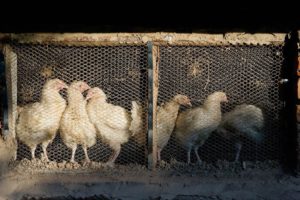The remote community of Patongo, northern Uganda is sowing the seeds, literally, of an agricultural project which will give 720 people a ‘hand-up’ to help themselves. The project will provide the startup costs of 4 small-scale agricultural co-operatives — a piggery, poultry farm, apiary and crop farm — all planned to help people generate sufficient income to lift themselves out of poverty. The first fodder crop for the pigs is now being planted as the rainy season begins.
Patongo was devastated by the brutal 20-year war between the LRA and the Ugandan government. The community was traditionally dependent on the land for survival, but most people were forced to abandon their farms to live in refugee camps during the war. Many people were killed or abducted, resulting in the loss of the community’s agricultural knowledge and experience, the main source of employment and income, leaving a generation with neither skills nor livelihood. Setting up small-scale agricultural projects will reduce dependence on aid, provide sustainable solutions, reintroduce lost agricultural heritage, and provide training opportunities for the whole community.
 The participants are all impoverished subsistence farmers, and 85% are women, some of whom are widows or former child soldiers. Women perform most of the agricultural work in Patongo, but rarely have access to farming resources as most of the
The participants are all impoverished subsistence farmers, and 85% are women, some of whom are widows or former child soldiers. Women perform most of the agricultural work in Patongo, but rarely have access to farming resources as most of the
land is owned by men. Increasing women’s financial independence will enable them to feed and educate their children, increase gender equality, and give them confidence to take on leadership positions in the community. Greater financial independence will also reduce the high levels of gender based violence, another side effect of war and its associated traumas. One agricultural group comprises people living with HIV, a direct legacy of the war; once they start the project, they will be able to afford more nutritious food, which will reduce their susceptibility to opportunistic illness and improve the effectiveness of their medicine.
The activities – raising, breeding and selling pigs and chickens and selling eggs, honey and food crops — will markedly increase the beneficiaries’ current average income of £167 per year.
The wider community will also benefit because the project will be a model for all. Lost farming heritage will be reintroduced, adding cultural value. Furthermore, tackling issues such as gender equality and HIV will ensure lasting impact. This has been built in to the group bylaws as well as ensuring adequate representation of women in leadership.